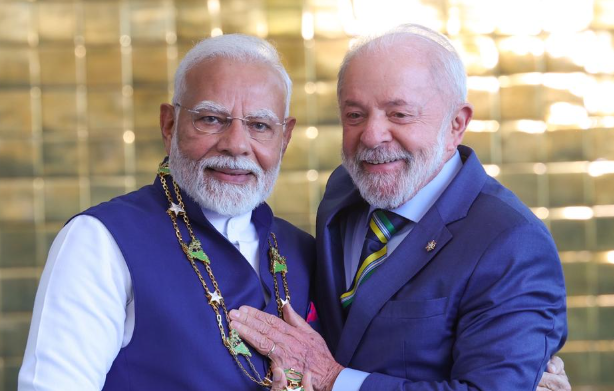During his official visit to Brazil for the 17th BRICS Summit, Indian Prime Minister Narendra Modi delivered a powerful, comprehensive speech that not only reaffirmed India’s deep strategic ties with Brazil but also offered a diplomatic yet firm response to the rising global tensions and challenges facing the Global South. Addressing Brazilian President Luiz Inácio Lula da Silva and assembled delegates, PM Modi covered wide-ranging subjects—from trade and defense to digital innovation, clean energy, and counter-terrorism cooperation.
Modi began his address by expressing heartfelt gratitude to President Lula and the Brazilian people for their warm hospitality in Rio and Brasilia. He described the experience as deeply moving and mesmerizing, especially due to the natural beauty of the Amazon and the spirit of friendship that Brazil offered. He also acknowledged the emotional significance of receiving Brazil’s highest national honor, dedicating it to 1.4 billion Indians and recognizing it as a tribute to the growing trust and friendship between the two democracies.
Referring to President Lula as the chief architect of the India-Brazil strategic partnership, PM Modi praised his counterpart’s enduring commitment to advancing bilateral ties. Every meeting with Lula, he said, energizes the shared mission of working for the prosperity and well-being of the citizens of both nations.

The two leaders set an ambitious target of elevating bilateral trade to $20 billion over the next five years. Using a light-hearted sports analogy, PM Modi referred to Brazil’s passion for football and India’s obsession with cricket, emphasizing that when both play on the same team, reaching the trade target becomes achievable. He also highlighted efforts to expand the India-MERCOSUR Preferential Trade Agreement, which would open more avenues for economic engagement.
Energy cooperation remains a key pillar, especially in clean and sustainable sources. The summit saw the signing of an agreement to boost collaboration in clean energy and environmental protection. PM Modi stated that the deal would give new direction and momentum to both countries' green goals. He also extended his best wishes to President Lula for hosting COP30 in Brazil later this year, underlining the importance of global climate commitments.
In defense cooperation, Modi stressed that increasing defense collaboration represents the deepening of mutual trust. He proposed further integration of the defense industries of both countries.
On technology and innovation, he underscored the rising collaboration in Artificial Intelligence and supercomputing, linking it to the shared vision of inclusive growth and human-centric innovation. PM Modi welcomed Brazil’s growing adoption of India’s UPI (Unified Payments Interface) and expressed eagerness to share India’s successful digital public infrastructure experience with Brazil. He also offered cooperation in space technologies.
Agriculture and livestock cooperation, a longstanding partnership area, is now expanding into agricultural research and food processing. Health partnerships were also in focus, with special emphasis on promoting Ayurveda and traditional medicine in Brazil.
People-to-people connections, Modi noted, are the bedrock of the India-Brazil relationship. Both countries are bound by a love for sports, vibrant cultures, and a shared zest for life. PM Modi emphasized making travel between the two nations easier and more accessible—free from long visa lines—especially for tourists, students, sportspersons, and entrepreneurs.
At the global level, PM Modi emphasized India and Brazil’s role as strong democratic voices for the Global South. He called for enhanced cooperation to bring the concerns and priorities of developing nations to global platforms. Stressing peace and diplomacy, he made it clear that all disputes must be resolved through dialogue and not conflict.
In a subtle yet firm remark that could be interpreted as a reply to recent threats and pressure from the West, PM Modi reinforced the India-Brazil partnership as a pillar of global stability and balance. He reiterated that there should be zero tolerance and zero double standards on terrorism, firmly rejecting any justification or support for it. He called for unified global action and a clear stance against nations supporting terrorism in any form.
Concluding his speech, PM Modi again expressed deep appreciation for the national honor bestowed upon him and invited President Lula to visit India, signaling the continuation of this growing partnership. His closing words in Portuguese, "Muito Obrigado" (Thank you very much), captured the spirit of mutual respect and cultural connection.
PM Modi’s address at the 17th BRICS Summit was not just a celebration of India-Brazil relations—it was a strategic message to the world. It reasserted India’s role as a confident, collaborative global leader, committed to peace, partnership, and prosperity for all.





